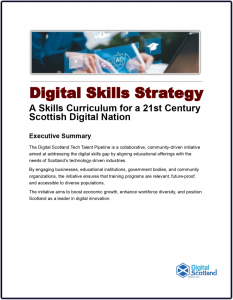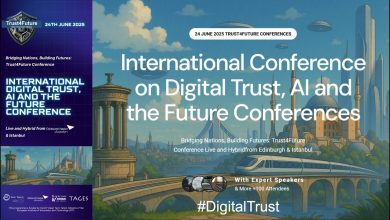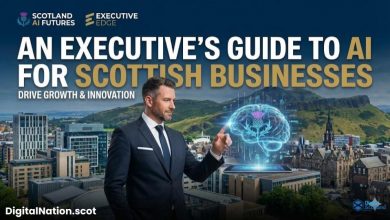How Might Scotland’s Education System Be Modernized for a Future of Work Being Transformed by AI
Preparing students for an AI-driven economy requires a bold reimagining of the Scottish Curriculum for Excellence, one that balances technological fluency with uniquely human skills.
 Scotland’s education system, with its rich legacy of fostering enlightenment and social progress, stands at a pivotal moment.
Scotland’s education system, with its rich legacy of fostering enlightenment and social progress, stands at a pivotal moment.
As AI reshapes the future of work, transforming industries from healthcare to renewable energy, the need to modernize education has never been more urgent.
Preparing students for an AI-driven economy requires a bold reimagining of the Scottish Curriculum for Excellence, one that balances technological fluency with uniquely human skills, ensures equitable access, and upholds Scotland’s commitment to fairness and inclusion.
This transformation must empower learners to not only navigate but also shape a world where AI is ubiquitous, fostering a generation of critical thinkers, creative innovators, and ethical citizens.
AI Literacy
At the heart of modernization lies the integration of AI literacy across all educational levels. From primary classrooms to universities, students need to understand AI’s principles and applications, from basic coding and data analysis to the ethical implications of algorithms.
This should not be confined to STEM subjects but woven into the fabric of the curriculum. Social studies could explore AI’s societal impact, such as algorithmic bias or misinformation, while arts programs might harness AI for creative projects like music composition or digital design.
Teachers, central to this shift, will require robust professional development to confidently incorporate AI tools, building on initiatives like those at the University of Edinburgh’s Bayes Centre. By embedding AI literacy, Scotland can ensure its students are fluent in the language of the future.
Ai Skills for the Workforce
Equally critical is equipping students with skills that complement AI rather than compete with it. The World Economic Forum projects that by 2030, most jobs will demand skills blending human creativity with technological collaboration. Scotland’s education system must prioritize critical thinking, problem-solving, and adaptability through inquiry-based and project-based learning.
For instance, Higher and Advanced Higher assessments could challenge students to tackle real-world issues, such as using AI to optimize renewable energy or address healthcare disparities. Creativity, a cornerstone of human potential, should be nurtured through arts and entrepreneurship programs, with partnerships in hubs like Dundee’s gaming industry offering practical experience.
Moreover, fostering a culture of lifelong learning is essential, as AI’s rapid evolution demands continuous upskilling. Expanding flexible pathways, such as micro-credentials through colleges like Glasgow Kelvin, can support workers throughout their careers.
AI itself offers transformative potential to personalize education and enhance inclusivity. Adaptive learning platforms can tailor lessons to individual students’ needs, ensuring no one is left behind, whether in rural Highlands schools or urban areas with diverse learners.
AI-driven analytics could provide teachers with insights to address learning gaps, while tools like speech-to-text or real-time translation can support students with disabilities or those learning English as a second language.
Digital Infrastructure
However, this requires investment in digital infrastructure, particularly in remote regions like the Outer Hebrides, where connectivity remains a challenge. The Scottish Government’s R100 program could prioritize schools, ensuring equitable access to AI tools while safeguarding data privacy under GDPR.
Beyond technical skills, Scotland’s education system must prepare students to navigate AI’s ethical and social challenges. Discussions on topics like AI-driven surveillance or job displacement should be integrated into subjects like Modern Studies, fostering critical awareness.
A focus on digital citizenship can equip students to combat misinformation and understand algorithmic influences, aligning with the Scottish Government’s Digital Strategy. Crucially, modernization must address equity to prevent AI from widening disparities. By investing in digital hubs and subsidized devices in underserved communities, Scotland can ensure all students benefit from AI education, upholding its commitment to fairness.
Strengthening ties between education and industry is vital to align learning with Scotland’s economic strengths. Expanding apprenticeships in AI-related fields, such as data science or robotics, can build on the Modern Apprenticeship framework, with partnerships involving companies like Skyscanner or FanDuel providing real-world exposure.
Universities, such as Edinburgh’s Bayes Centre, can serve as innovation hubs, developing curricula and resources that filter into schools. By tailoring AI education to sectors like renewable energy or healthcare, Scotland can prepare students for both local and global job markets. Additionally, career guidance must evolve to highlight emerging roles like AI ethicists, using AI tools to match students’ skills with opportunities.
Conclusion
Modernizing Scotland’s education system for an AI-driven future is a complex but achievable goal. It demands investment in infrastructure, teacher training, and equitable access, alongside policies to address ethical concerns like data privacy.
By fostering AI literacy, nurturing human-centered skills, leveraging AI for personalized learning, and forging strong industry partnerships, Scotland can create an education system that not only adapts to change but leads it. Rooted in its values of community and progress, Scotland has the opportunity to empower a generation to harness AI for a better, fairer future—ensuring that education remains a cornerstone of its national identity in an AI-driven world.



